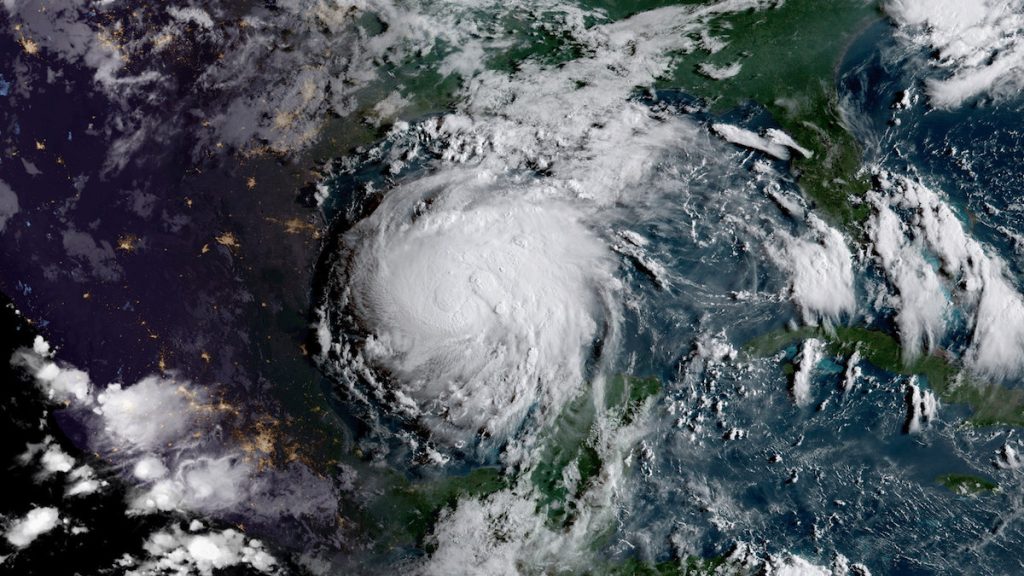The headlines roar. The feelings, however, are more nuanced. A disaster this big throws both shade and light, just like meditation itself can do. Our own and others’ afflictions are exacerbated, and our goodness shines brighter.
That’s what we’ve seen here in Houston. I’m riveted by the overwhelming elemental power of the storm, the angry people waiting in long lines at gas stations, and the heartwarming human grace the situation inspires in people of so many races, religions, and nationalities in what has become the most diverse city in the United States.
By late Friday afternoon we had shopped for food, despite empty shelves not seen here since Hurricane Rita, the last big hurricane that hit in 2005. The rain cut loose completely after that. Not silently, but with loud bouts of thunder following big bolts of lightning. Even though I think I know what a hurricane can do, I’m stunned at what the freshly unleashed forces of nature feel like.
Below the skies dripping with menace and amid the streams and bayous bursting their basins were people from all walks of life helping their neighbors.
Among them, a Jesse Gonzalez and his son rescued people in southeast Houston by boat. On Monday I first learned of the Louisiana Cajun Navy, born in the chaos of Hurricane Katrina, who brought their vessels to Houston to help.
A woman was stuck in her apartment on the 15th floor of a government-subsidized highrise in the city’s tony Memorial area. The elevator was busted. No less than 10 individuals from the neighborhood climbed the stairs to bring her and other residents food, water, Band-aids. This didn’t make the newspapers—this is someone I know.
And everything that is going on is caught up in the political crosshairs. When I Google Cajun Navy, ads for Breitbart News come up. Mexican officials pledge to support Texas, and to help as much as they can. Texas governor Greg Abbott, who is a Trump supporter, said his state would accept Mexico’s disaster relief assistance. And there are those who take to social media to say vile things about Houston Mayor Sylvester Turner—the city’s first black mayor—not to evacuate the city. Turner has defended his decision, saying that evacuating the whole city would create too much danger and chaos—which is what happened during the mass evacuation during Rita in 2005.
Nothing is simple or clear-cut. There is nirvana right here, and samsara too. Things are so deeply connected and intertwined that getting caught in minutia without a broader view can cloud the big picture, even as it clarifies a portion of it. Buddhist students of dependent arising can find endless meaning in this.
On the other side of our globe, millions are suffering from unprecedented floods in India, Nepal, and Bangladesh, which has left 1,200 dead and millions homeless “in one of the worst flooding disasters to have affected the region in years.” One-third of Bangladesh is underwater.
Do we see these as one-off disasters, or do we see a pattern called climate change? Does anguish at our own floods collapse our attention as well as our whole sphere of concern onto our own city? Or does our plight open our hearts to greater concern and a stronger wish to help those in a similar situation in southeast Asia? And how does my practice open up the collapses, the blinding narrowness, I discover in my psyche during this or any of life’s storms?
Another way to ask this, as a human being and as a Buddhist practitioner, is whether I can focus finely without impeding a vaster perspective. “Think globally, act locally” is a brilliant meme.
What kind of training of body, speech, and mind opens the way to see the wide skies as well as the drops of rain they hold—to know the sun’s presence even when clouds occlude? In classical Buddhist language, how do we remember emptiness in the blaze of amazing appearances? How can we hold compassion strongly for those whom our ordinary mind might deem unworthy?
The ruptures that create categories of good and bad don’t disappear from sight in or out of crises. But we practice so that they don’t rule our hearts or minds, either. We can aspire to a broader view right in midst of stormy skies and good neighbors, kind minds and conniving miscreants, not limiting our vision to either. We practice recognizing that they don’t cancel each other out, even if they change the context of our experience. And we practice to break free of reactivity, so as to move with a depth of understanding and kindness that can only emerge through seeing the whole interlaced dependent arising of this moment’s interwoven presence, and our own.
Thank you for subscribing to Tricycle! As a nonprofit, we depend on readers like you to keep Buddhist teachings and practices widely available.
